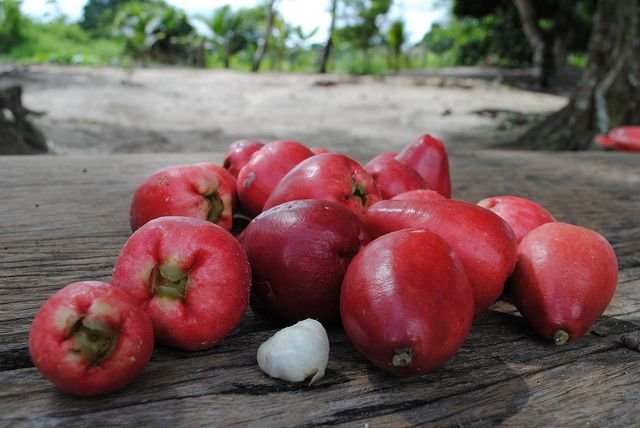Benefits of pumarosa, a fruit with interesting nutritional properties in the diet and in any healthy diet, which is usually confused with apple cider.

The Pumarosa is a fruit that is often confused with the names of rose apple and rose apple, which have also been christened with the curious name of pink apple (though we should note that not at all like an apple or fruit or his tree).
It is a fruit that belongs to the myrtle family, whose tree tends to reach a maximum height of 15 meters. Its flowers are creamy-white (which sometimes also tends to be greenish-white), while the fruit has a fairly characteristic bright green color.
The fruit is usually consumed fresh, and although it has a sweet taste, it also tends to be tasteless and dry.
Nutritional benefits of pumarosa
Pumarosa is a fruit that stands out for its high content of pectins, vitamins (vitamin A, B3 and vitamin C), minerals (mainly calcium and iron) and beta-carotene. In addition, it is low in calories and fat, so its consumption is suitable not only in balanced diets, but also low in fat that pursue the goal of losing weight.
Below we summarize the nutritional contribution of pumarosa:
- Calories: 25 kilocalories.
- Carbohydrates: 7.90 gr.
- Proteins: 0.50 gr.
- Fat: 0.40 gr.
- Minerals: calcium (10 mg) and iron (0.20 mg).
- Vitamins: vitamin A (18 mg), vitamin B3 (0.25 mg) and vitamin C (20 mg).
Pumarosa properties
Thanks to its high content of vitamin C, it is a fruit that is especially suitable for protecting against colds and flu, in turn helping to increase defenses.
In El Salvador, its consumption is common in the treatment of diabetes thanks to its beneficial effect on the pancreas, as long as – for example – it is consumed as a dessert before or after meals.
It is also suitable in case of excessive urination, although it stands out because it is also capable of controlling thirst, improving the hydration of our body.
Its bark has an emetic effect, so it should be consumed in moderation, or avoid it if we are very sensitive to this property.
Its leaves stand out for their high iodine content, which is why it is common in weight loss diets in the form of an infusion or herbal tea.































